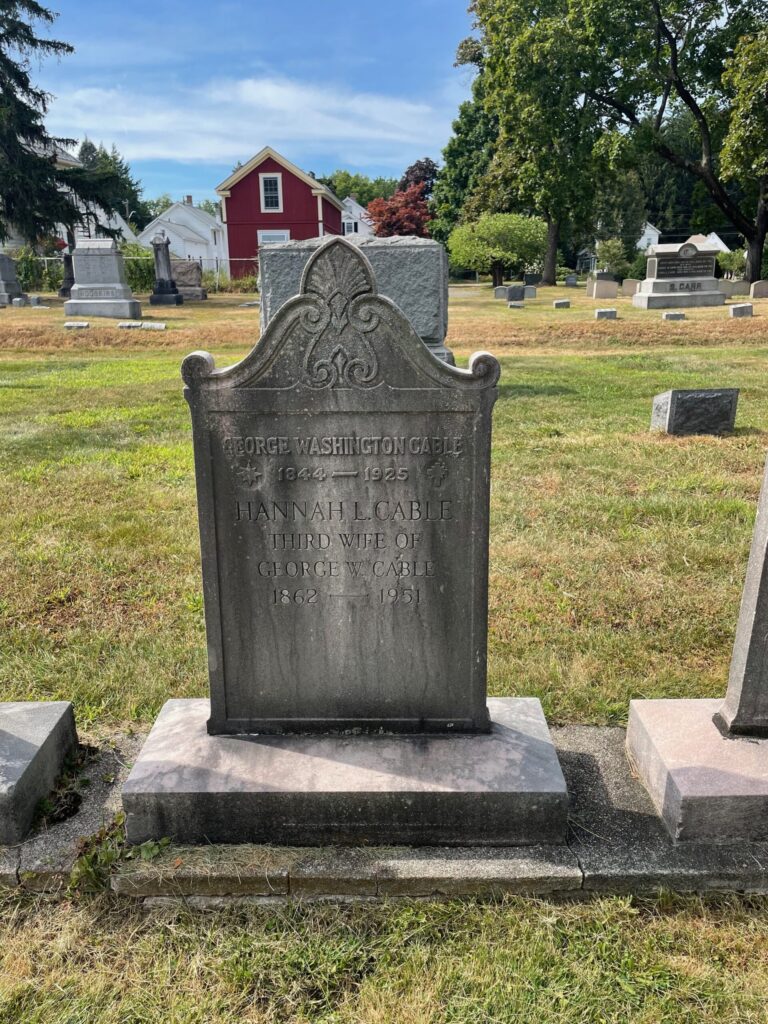Erik Visits an American Grave, Part 1,372
This is the grave of George Washington Cable.

Born in New Orleans in 1844, Cable grew up rich and that meant having slaves. His family were big time local elites, though as was really common especially in the South, his father died young and he was massively overinvested in questionable speculations and it killed the family fortune. So Cable had to go to work. Like anyone who grew up in this milieu, it’s hardly surprising that our young man here committed treason in defense of slavery and joined the Confederate Army.
But then things got interesting. He was wounded twice and then left the military. Malaria was the reason, not too shocking given where he was from, He was basically down for two years. By 1865, he was working for the New Orleans Picayune and in 1870, he started working for them as a journalist. That put on the front lines of reporting Reconstruction. He also started writing fiction and he could sell it. Scribner’s published his story “Sieur George” in 1873 and he became a regular writer there. What the magazine really wanted was stories of Creole life and he was happy to provide them. I am sure they are terrible if read today, but whatever, it made him a known writer around America. The stories also started taking on an interesting political tone because he started talking about race. Specifically, he discussed the multi-racial Creoles and white supremacist America and the battles and tensions between the two societies after the Louisiana Purchase, one that his own grandparents had engaged in when they moved to Louisiana after 1803.
In 1879, Cable quite the newspaper to support himself through his fiction. He published his first novel, The Grandissimes: A Story of Creole Life, in 1880 and it went pretty deep into the race relations of early 19th century New Orleans. Yes, it was a kind of ridiculous historical romance/realist novel, but this stuff began to hit more than a wee bit too close to home for a lot of the New Orleans elite. That was especially true because by this time, Cable had clearly turned against slavery and white supremacy. He was open about the horrors of slavery under the American system (while probably downplaying the badness of the French system of slavery, but there were differences there worth remembering).
Then came Madame Delphine, in 1881, that flat out talked about miscegenation. He published a book about prison reform in 1884. He started writing against Jim Crow. He talked about the failures of Reconstruction and the horrors of the KKK and, more relevant in Louisiana, The Knights of the White Camellia.
The government also hired Cable around this time to do a historical study of New Orleans for the 1880 census, which ended up being a 213 page book that the government had no idea what to do with. The entire thing did get published….in 2008.
But he basically became persona non grata in the white South. He finally decided to leave the region entirely, sick of the bullshit he personally faced and the horrible system of racial repression there. He moved to Massachusetts with his family in 1885. He kept writing about the South though, mostly the kind of bad romances that he specialized in. He could do this and have his readers and not be attacked in the streets and such.
While in New England, Cable’s reputation soared. He and Mark Twain became buddies and did speaking tours together. Twain, who suffered no fools except perhaps Ulysses S. Grant, loved Cable and talked about his incredible honesty and bravery. In Life on the Mississippi, Twain wrote of Cable:
The party had the privilege of idling through this ancient quarter of New Orleans with the South’s finest literary genius, the author of “the Grandissimes.” In him the South has found a masterly delineator of its interior life and its history. In truth, I find by experience, that the untrained eye and vacant mind can inspect it and learn of it and judge of it more clearly and profitably in his books than by personal contact with it.
With Mr. Cable along to see for you, and describe and explain and illuminate, a jog through that old quarter is a vivid pleasure. And you have a vivid sense as of unseen or dimly seen things—vivid, and yet fitful and darkling; you glimpse salient features, but lose the fine shades or catch them imperfectly through the vision of the imagination: a case, as it were, of ignorant near-sighted stranger traversing the rim of wide vague horizons of Alps with an inspired and enlightened long-sighted native.
Of course, no one thinks Cable is some great writer today, or at least I haven’t met them. He continued to do his thing, with his last book being Lovers of Louisiana, which sounds like a great country album title, in 1918. But he was pretty influential. He was a critical figure in the rise of the Southern gothic style and influenced Faulkner and that whole great generation of Southern writers. He was a pretty lurid and violent writer. There weren’t happy endings in these romances. There was just more violence down the line. Given how universal white supremacy was in the early 20th century, Cable wasn’t just critiquing Louisiana. He was critiquing America.
He outlived a couple of wives, married a third, and died in St. Petersburg, Florida in 1923, I think while on vacation. That was the beginning of the Florida boom after all. He was 81 years old.
George Washington Cable is buried in Bridge Street Cemetery, Northampton, Massachusetts.
If you would like this series to visit other southern writers, you can donate to cover the required expenses here. James Agee is in Hillsdale, New York and Harper Lee is in Monroeville, Alabama. Previous posts in this series are archived here and here.


